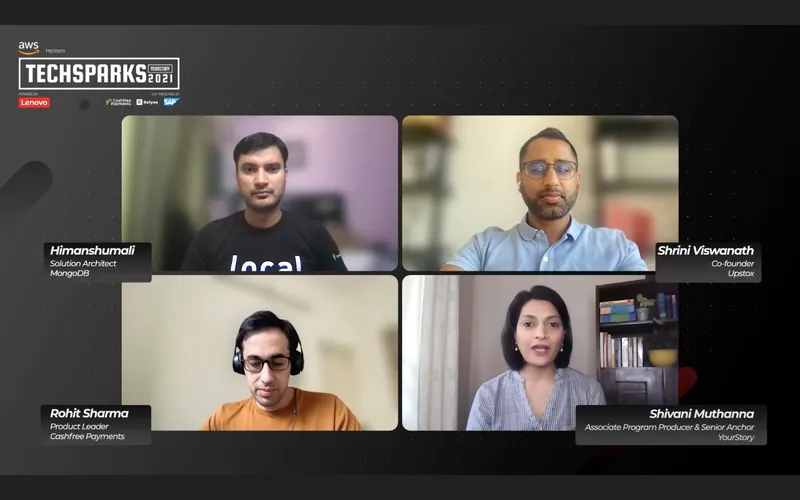Start early, say product and tech practitioners on data monetisation journey
On Day 3 of TechSparks 2021, leaders from MongoDB, Upstox and Cashfree Payments discussed how businesses, especially in payments, could benefit from data monetisation.
While there’s no doubt that data is the biggest asset for any business today, it needs to be broken down and analysed for it to provide value and therein make way for monetisation. This is especially true in the case of fintech solution providers in the area of payments.
One of the key questions that fintech startups are continuing to explore in depth is how payments’ data can be leveraged to reach previously unserved customer segments, open up new revenue streams, among others.
TechSparks 2021 witnessed Himanshumali, Manager, Solution Architect, ; Shrini Viswanath, Co-founder, ; and Rohit Sharma, Product Leader, , sharing insights on data monetisation from their experience as technology and fintech solutions providers.

How fintech startups are leveraging data
Upstox, as one of the largest fintech players in India and the second-largest brokerage tech player in the country, started off at a time when there “was absolutely no data,” because paper-based documentation was an industry mandate. “However, we began investing in the digitisation process early and made it available because we believed the future lay in data. Fast forward to five years today, we no longer get paper-based forms to open a brokerage account. So everything from customer onboarding to trading is now digital,” shared Shrini.
He added the digitisation of the process enables the startup to provide customers with better service and support. Talking about end-user support — an area where data has played a key role in enhancing customer experience — he shared, “BFSI sector, along with telecom and airlines are ranked by customers as offering poor customer support. We are working hard to change that perception.”
And, the way they are doing that is by collecting a mass volume of possible questions that customers are likely to ask and start putting that into a chatbot, which then continues to get refined as more data gets fed into it. “Data, coupled with AI and ML will eventually offer responses that are personalised and will aid in enhancing customer support,” he said.
Talking about how data is playing a key role for a payment platform, Cashfree’s Rohit shared that from a micro-perspective the data was being leveraged to optimise payment conversions and cost efficiencies. From a macro perspective, data has been at the cornerstone of the startup’s product roadmap and prioritisation.
“A lot of our investment in future products and features is based on what we see in our data. For example, what kind of payment methods are being used often or what are the customers looking for,” he shared.
With the overall market for global data monetisation market expected to touch $11 billion by 2026, MongoDB’s Himanshumali noted that data monetisation in the payment space in India could continue to drive major impact in three key areas — improving internal operations, meeting compliances for better customer service and bringing premium value-added services.
Building the data monetisation strategy
Organisations must answer three steps to build a data monetisation strategy, Shrini shared. The first is getting the raw data. Second is what trends the raw data indicates. Third and the most important - why does this matter? He highlighted that most organisations struggle at the third step, hence they must focus on getting that answered and then tie that to the overall organisation’s goal.
He added that businesses must understand that building a data pipeline is an investment and not a one-time effort. “It's not something where you can put some money towards and then get an answer right away. It's a continuous process,” he said.
Echoing similar sentiments, Rohit shared, “When you are investing in data, you might never get all the answers up front, yet it is important to actively invest in data and ensure everyone in the team has access to this data. They would then come with questions which in turn will see the organisation using the data in some format.” This is where Cashfree stands wherein every team member has access to data and productisation happens through the use of this data.
“If you look at the core of MongoDB, the model in which we store data maps very well with the message objects that we have in payments. So there is clear fitment. Additionally, scenarios of real-time analytics can be really built on MongoDB,” shared Himanshumali. At a time when regulations and customer-centric approaches are evolving rapidly, the security, flexibility and agility that the MongoDB database provides for scalable solutions add value to businesses.
“With the capabilities of MongoDB, payment platforms are better positioned to ace their data monetisation strategies,” he shared.
Himanshumali also detailed the many advantages of MongoDB Atlas Database - a fully managed cloud database for modern applications. He shared, “Atlas is not just a database but acts like a data platform because of the different capabilities it can provide across the data segment. So, it is not just a database for storing and querying data.”
A simple use case of MongoDB Atlas and the advantage it brings would be in the case of syncing the mobile app to the backend infrastructure or pushing data from the backend database to the mobile. While it is traditionally done by business, on Atlas, this will be a managed capability. Atlas Search, another capability on the platform, helps to optimise searches.
“These and the many different capabilities of the platform do the heavy-lifting for any provider building its application on MongoDB Atlas,” said Himanshumali.
Data monetisation: when and where to start
The three panellists emphasised that businesses should start their data monetisation journey early on and here Shrini noted that it was extremely important to safeguard data and be compliant.
“Whenever you're working with data, you need to handle it with care. Businesses need to make sure that they're compliant with the local laws across the geographies that they are present in. When you are working with customer data, it is important to remember that we are working with their data, not owning it,” he stated.
Shrini recommended that while building data platforms, businesses must pay attention to having the right databases. The next step is to take the data from the database and move it to a data lake based on the cloud. The third step is to apply AI and ML learnings and third-party tools to pull it out of the data lake, analyse it and make sense of the data. Once you have everything consolidated into a data lake, you can apply your AI. “When you're pushing things in a data lake, try to make sure that it's as anonymous as possible,” he advised.
Rohit suggested that once startups reach or are about to reach the product-market fit stage, it's time to think about data monetisation. “Think about your data strategy, think about how data fits in your business and start building. Initially, the scale will be small. But, this helps to build and iterate faster and in doing so you will realise how valuable the data is that you're producing and what kind of insights you can get from it,” he said.
To log in to our virtual events platform and experience TechSparks 2021 with thousands of other startup-tech enthusiasts from around the world, join here. Don’t forget to tag #TechSparks2021 when you share your experience, learnings and favourite moments from TechSparks 2021.
For a line-up of all the action-packed sessions at YourStory’s flagship startup-tech conference, check out TechSparks 2021 website.









